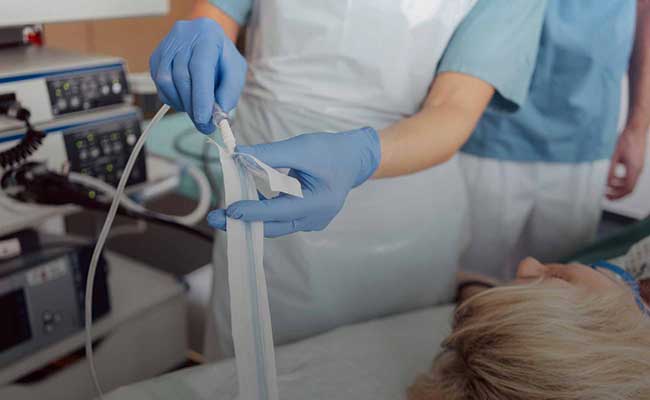Gastroscopy
What is a Gastroscopy?
A gastroscopy (also known as an endoscopy) is a procedure that allows the examination of the lining of the upper intestinal tract, including the oesophagus, stomach and duodendum (the upper part of the small bowel).
A thin and flexible instrument called an endoscope is used for the procedure. Endoscopes are about a finger’s width across, and contain their own light source and camera lens. They transmit images of the upper intestinal tract to a video monitor for Dr Adams to view during the procedure.
Why would Dr Adams recommend one?
Gastroscopy is usually performed to investigate problems in the upper intestinal tract, including:
- Indigestion
- Anaemia
- Vomiting
- Weight loss
- Black stools
- Difficulty swallowing

Gastroscopy allows Dr Adams to see if there is inflammation, an ulcer, polyps (small benign growths), or another type of problem. The procedure also biopsies of anything unusual and some other treatments if indicated.
What preparation is required?
Do not eat or drink anything for at least six hours before your procedure. This is to ensure your stomach is completely empty, so Dr Adams has a clear view during the test.
Dr Adams will take a medication history during your initial visit and advise which can be continued and which need to be temporarily stopped. Blood thinners are the most common medications that need to be stopped including warfarin, clopidogrel, apixaban, dabigatran, rivaroxaban and anti-inflammatories.
What should I expect during the procedure?
Dr Adams and the anaesthetist will meet you immediately prior to your procedure. The anaesthetist will take a health history, and insert a drip for administering your medication. You will then be moved to the procedure room and asked to roll on your side. You will also have a mouth guard inserted as comfortably as possible.
The anaesthetist will then set up monitoring equipment, fit you with nasal oxygen, and administer the drugs for your procedure. Most patients are asleep for their procedure. However, some patients with complex medical problems may have a local anaesthetic spray in their throat and very little sedation. The nature of your sedation will be discussed with you by the anaesthetist on the day of the procedure, If you have any concerns about being over or under-sedated please discuss this with them then.
Once you are asleep, the endoscope is gently passed through your throat into your gut. The oesophagus (food pipe), stomach and first part of the bowel are then examined for abnormalities. Biopsies are taken if needed. Sometimes, other treatments can be undertaken as necessary.
The procedure itself takes about 10-20 minutes. When the test is finished, the endoscope is removed and you are sent to recovery.
What happens following my procedure?
A nurse will stay with you in recovery to monitor you while you wake up from the sedation. Dr Adams may or may not see you depending on if she is performing procedures on other patients. But if a major problem is found, Dr Adams will make sure she informs you on the day.
As you will be groggy from the sedative, you may forget information given to you while you are in recovery. Also, any biopsy results will take 1-2 weeks to come back. For these reasons, it’s preferable to see Dr Adams in the clinic as a follow up appointment instead of straight away.
You may be a bit drowsy or lightheaded for a short while after your procedure. You may also feel a little bloated or burp. This is completely normal and will pass.
The after effects of the sedative can take up to 24 hours to completely wear off. So it’s important to have someone collect you, drive you home, and stay with you for a day. Also, avoid signing legal papers or making important decisions for at least a day after your procedure. Do NOT drive a car.
Dr Adams will see you in her clinic in one or more weeks, once any biopsy results are available. Please contact her rooms to arrange an appointment if you do not hear from her secretary.
What are the risks?
A gastroscopy is considered a very safe procedure. However, as with any medical procedure, there is a small risk of complication during or after the test.
These can include:
- Reaction or sensitivity to the sedation
- Bleeding from biopsy sites
- Perforation (tearing or putting a hole) in the lining of the oesophagus, stomach, or duodendum
Other more serious risks including issues with the heart or lungs are very rare. Dr Adams will discuss the procedure and happily address any concerns you have at your initial consult.

